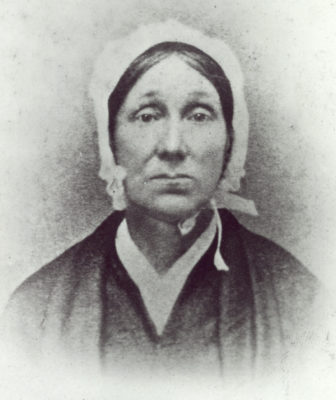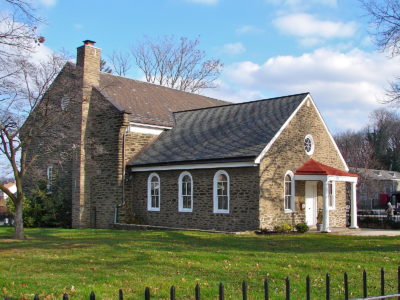“Sarah Righter Major was entirely out of place among the Brethren and yet remained entirely in her place. And that is how she became the first, and, for decades, the only woman preacher in the fraternity. Sarah was born August 29, 1808 near Philadelphia, Pennsylvania. When she was eighteen, she heard Harriet Livermore preach, and the event changed her life. Miss Livermore was a well-known preacher whom the more progressive Philadelphia area Brethren sometimes allowed to preach, something Brethren in the rural areas would have been much less likely to permit.
Apparently, Harriet Livermore did more than convert young Sarah. She also set a provocative example, for shortly after Sarah joined the church, she herself felt called to preach. She knew how the Brethren felt about women preachers. They took Paul’s admonition in 1 Corinthians 14.34-35 very seriously: “Let your women keep silence in the churches: for it is not permitted unto them to speak; but they are commanded to be under obedience, as also saith the law. And if they will learn anything, let them ask their husbands at home: for it is a shame for women to speak in the church.” (KJV)
Therefore, Sarah suppressed her calling for a time, but without much success, for she soon fell into melancholy and her father noticed that something was wrong. He questioned her and she confided her strange calling. You can imagine her relief when she found him sympathetic, and her surprise when even her elder was supportive. She began to preach publicly at the Philadelphia church. …by 1834, eight years later, she was known well enough across the brotherhood to draw the attention of Yearly Meeting. She found that they were not as open as her home church. In that year a query was submitted:
–Concerning a sister’s preaching.
–Not approved of; considering such a sister being in danger, not only exposing her own state of grace to temptation, but also causing temptations, discord, and disputes among other members. (Annual Meeting Minutes, 1834, Art.13)
Sarah, however, continued to preach. The elders at Yearly Meeting decided to send a committee to silence her; one was duly appointed and dispatched. After considerable discussion, the elders came away without enforcing the meeting’s decision. When asked about the matter, Elder James H. Tracy of Indiana, one of the committee members, replied bluntly, “I could not give my voice to silence one who can outpreach me.” And so the brotherhood and Sarah came to a tacit understanding. [Sister Sarah could preach in her own church, but other churches may not permit her to speak unless every member was in favor.] And that remained the practice throughout her life.
[After her marriage to Thomas Major, a minister in her home church, she and her husband witnessed together. Generally, he would open the service and then invite his wife up from her seat in the congregation to speak.] Throughout their long life together, he consistently encouraged her ministry and stood aside to make way for her. However, Sarah was a quietly determined woman, and we may presume that she would have persisted without her husband’s support.”
The above excerpt is from The Old Brethren, by James H. Lehman (1976). He goes on the discuss accounts of Sister Sarah’s preaching given by those who heard her. The accounts all agree that Sarah always gave careful deference to the leadership of men, which softened resistance to her speaking. The accounts also agree that once the people heard her speak, they always wanted to invite her back again. In one account from Brother J. H. Warstler, he describes his initial disappointment that Sarah had chosen to share an “old, plain, simple” text. But Sister Sarah then proceeded to expound on this “old” text in ways that Brother Warstler described as a “masterpiece of workmanship.” Sarah preached wherever she was received. People loved to hear the “woman preacher,” going out of curiosity and returning with appreciation.
Sarah was known for her concern for African Americans, prisoners, and the the sick, often preaching at penitentiaries and infirmaries. She and her husband were the only two white people at the first love feast of the black Brethren. Sarah lived with her husband in Ohio, farmed the land, bore five children, and continued preaching with her usual quiet force until the end of her life in 1884. It would not be until 1922 that the Church of the Brethren would permit women to be licensed to preach. In 1958, it was granted that women could be ordained to ministry on the same basis as men. Sister Sarah’s words remind us: “God always gave his gifts freely where they were willing to use them, and I believe in Christ Jesus male and female are one, just as Jew and Gentile are made one. Every one should do as much as they can to glorify God with the different gifts of the Spirit of God.”
Additional source: Women at the Well, Edited by Betty Jo Buckingham, 1987

